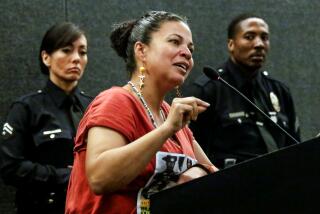NEWS ANALYSIS : Keeping King Off Stand Was a Wise Move, Experts Say
Although highly unusual, the surprise decision by prosecutors not to call Rodney G. King as a witness was wise considering the strength of the videotape of his beating by four Los Angeles police officers and questions about his own conduct, according to a wide array of legal experts.
Had Los Angeles County Deputy Dist. Atty. Terry White put King on the stand, he would have risked shifting the trialâs focus from the officersâ conduct--âso plainly reflected on the videotapeâ--to Kingâs behavior when he led authorities on a high-speed chase while legally drunk, veteran Los Angeles criminal defense lawyer Stanley Greenberg said.
While a number of attorneys, criminal law professors and jury consultants interviewed by The Times agreed with Greenberg, the verdict was not unanimous.
Criminal lawyer Barry Levin, who is a former Los Angeles police officer, said the tactic could âcause an erosion of confidence in the prosecutionâs case by the jury.â He said the only time he could recall a prosecutor not putting an assault victim on the witness stand was when the victim was dead or had disappeared.
Loyola University criminal law professor Laurie Levenson said she was not surprised by the prosecutorsâ unusual, though not unprecedented, decision to bypass King during the presentation of their case.
âThe prosecutors had other firsthand evidence--the videotape and other eyewitnesses,â she said, adding that King also had made prior statements about the incident that the defense lawyers would attempt to impeach.
âYou have to worry about handing ammunition to the defense,â she said. âYou have to worry about whether your witness is sympathetic. Rodney King writhing on the ground on that videotape is a disturbing picture,â she said, but what King would be like on the stand is unpredictable.
Levenson said that by keeping King off the witness stand, the prosecution also was able to distance itself from a potentially unsympathetic victim and present the case simply as âthe community versus these officers.â
Criminal defense lawyer Jan Handzlik put it another way: âIâm sure the prosecutors donât want to base their case on the credibility of Rodney King.â
King, in fact, may be called to the stand by the defense. But, according to criminal lawyer Mary Kelly, they will be restrained from the kind of aggressive interrogation they could have conducted while cross-examining him during his appearance as a prosecution witness. As a result, she said, the prosecution would have succeeded in limiting damage to Kingâs credibility.
Nearly all of the attorneys and other criminal law specialists interviewed said they thought the potential downside of jurorsâ wondering if prosecutors were hiding something by not calling King was outweighed by the potential risks in letting him testify.
âWhen you have a case like this, the jurors would expect and would want to hear from the victim,â said defense lawyer Johnnie L. Cochran Jr., who specializes in police misconduct cases.
He said he was reluctant to second-guess the prosecutors because he had not interviewed King. But he said that, as a witness, King clearly has âsome baggage,â including an interview he gave describing the incident in a way that conflicted with aspects of the videotape.
Before the trial started, observers speculated that King might have been on the stand for up to two weeks as defense lawyers tried to impeach his testimony and undermine his credibility by portraying him as a drunk ex-convict who provoked the four Los Angeles police officers accused of beating him.
One lawyer, speaking on condition of anonymity, said he thought that the racial dynamics of the situation could not be ignored. King is black. All of the defendants are white, as are all of the jurors.
The attorney said that keeping King on the sidelines was a means of preventing a âWonder Bread white juryâ in Simi Valley from focusing attention on a black victim with a checkered past.
Several of the experts said, however, they thought it was possible that the prosecutors might call King as a rebuttal witness after the defense presents its case. Under those circumstances, the prosecutors could question him in a focused way on what they view as the shortcomings of the defense case.
âFrom the prosecutionâs point of view, the best time for King to explain his actions is after the defense had laid out their account of what happened,â said Lois Haney of the National Jury Project. Haney, who has worked as a consultant on many major trials, said it would be a âgutsyâ move not to call King at all because of the jurorsâ expectation that they be able to hear from the victim at some point.
Haney said it was difficult to predict the juryâs reaction to Kingâs absence. Some jurors, she said, might consider it unimportant because of the videotape and other witness testimony, while others might think the prosecution has something to hide. Still others, Haney suggested, might speculate that King had been beaten so badly that he was unable to testify.
More to Read
Sign up for Essential California
The most important California stories and recommendations in your inbox every morning.
You may occasionally receive promotional content from the Los Angeles Times.










